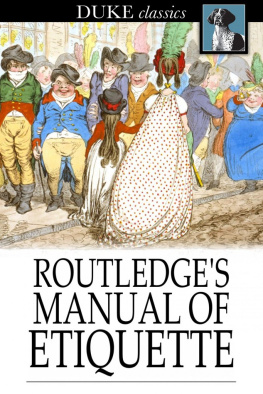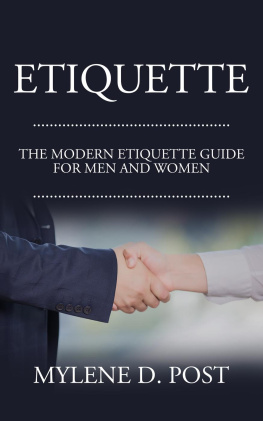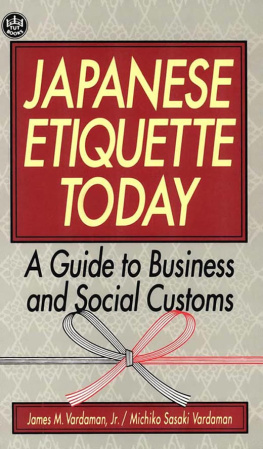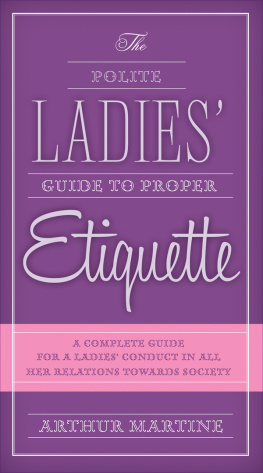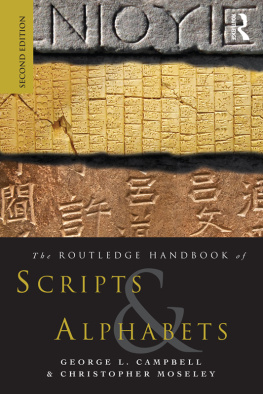George Routledge - Routledges Manual of Etiquette
Here you can read online George Routledge - Routledges Manual of Etiquette full text of the book (entire story) in english for free. Download pdf and epub, get meaning, cover and reviews about this ebook. publisher: Duke Classics, genre: Romance novel. Description of the work, (preface) as well as reviews are available. Best literature library LitArk.com created for fans of good reading and offers a wide selection of genres:
Romance novel
Science fiction
Adventure
Detective
Science
History
Home and family
Prose
Art
Politics
Computer
Non-fiction
Religion
Business
Children
Humor
Choose a favorite category and find really read worthwhile books. Enjoy immersion in the world of imagination, feel the emotions of the characters or learn something new for yourself, make an fascinating discovery.
- Book:Routledges Manual of Etiquette
- Author:
- Publisher:Duke Classics
- Genre:
- Rating:5 / 5
- Favourites:Add to favourites
- Your mark:
- 100
- 1
- 2
- 3
- 4
- 5
Routledges Manual of Etiquette: summary, description and annotation
We offer to read an annotation, description, summary or preface (depends on what the author of the book "Routledges Manual of Etiquette" wrote himself). If you haven't found the necessary information about the book — write in the comments, we will try to find it.
Routledges Manual of Etiquette — read online for free the complete book (whole text) full work
Below is the text of the book, divided by pages. System saving the place of the last page read, allows you to conveniently read the book "Routledges Manual of Etiquette" online for free, without having to search again every time where you left off. Put a bookmark, and you can go to the page where you finished reading at any time.
Font size:
Interval:
Bookmark:

First published in 1875
ISBN 978-1-62011-021-8
Duke Classics
2012 Duke Classics and its licensors. All rights reserved.
While every effort has been used to ensure the accuracy and reliability of the information contained in this edition, Duke Classics does not assume liability or responsibility for any errors or omissions in this book. Duke Classics does not accept responsibility for loss suffered as a result of reliance upon the accuracy or currency of information contained in this book.
To introduce persons who are mutually unknown is to undertake aserious responsibility, and to certify to each the respectability ofthe other. Never undertake this responsibility without in the firstplace asking yourself whether the persons are likely to be agreeableto each other; nor, in the second place, without ascertaining whetherit will be acceptable to both parties to become acquainted.
Always introduce the gentleman to the ladynever the lady tothe gentleman. The chivalry of etiquette assumes that the lady isinvariably the superior in right of her sex, and that the gentlemanis honoured in the introduction. This rule is to be observed even whenthe social rank of the gentleman is higher than that of the lady.
Where the sexes are the same, always present the inferior to thesuperior.
Never present a gentleman to a lady without first asking herpermission to do so.
When you are introduced to a gentleman, never offer your hand. Whenintroduced, persons limit their recognition of each other to a bow.On the Continent, ladies never shake hands with gentlemen unless undercircumstances of great intimacy.
Never introduce morning visitors who happen to encounter each otherin your drawing-room, unless they are persons whom you have alreadyobtained permission to make known to each other. Visitors thuscasually meeting in the house of a friend should converse with easeand freedom, as if they were acquainted. That they are both friends ofthe hostess is a sufficient guarantee of their respectability. To besilent and stiff on such an occasion would show much-ignorance andill-breeding.
Persons who have met at the house of a mutual friend, without beingintroduced, should not bow if they afterwards meet elsewhere. A bowimplies acquaintance; and persons who have not been introduced are notacquainted.
If you are walking with one friend, and presently meet with, orare joined by, a third, do not commit the too frequent error ofintroducing them to each other. You have even less right to do so thanif they encountered each other at your house during a morning call.
There are some exceptions to the etiquette of introductions. At aball, or evening party where there is dancing, the mistress of thehouse may introduce any gentleman to any lady without first asking thelady's permission. But she should first ascertain whether the lady iswilling to dance; and this out of consideration for the gentleman,who may otherwise be refused. No man likes to be refused the hand of alady, though it be only for a quadrille.
A sister may present her brother, or a mother her son, without anykind of preliminary; but only when there is no inferiority on the partof her own family to that of the acquaintance.
Friends may introduce friends at the house of a mutual acquaintance;but, as a rule, it is better to be introduced by the mistress of thehouse. Such an introduction carries more authority with it.
Introductions at evening parties are now almost wholly dispensed with.Persons who meet at a friend's house are ostensibly upon an equality,and pay a bad compliment to the host by appearing suspicious andformal. Some old-fashioned country hosts yet persevere in introducingeach new comer to all the assembled guests. It is a custom thatcannot be too soon abolished, and one that places the last unfortunatevisitor in a singularly awkward position. All that she can do isto make a semicircular courtesy, like a concert singer beforean audience, and bear the general gaze with as much composure aspossible.
If, when you enter a drawing-room, your name has been wronglyannounced, or has passed unheard in the buzz of conversation, makeyour way at once to the mistress of the house, if you are a stranger,and introduce yourself by name. This should be done with the greatestsimplicity, and your rank made as little of as possible.
An introduction given at a ball for the mere purpose of conducting alady through a dance does not give the gentleman any right to bow toher on a future occasion. If he commits this error, she may rememberthat she is not bound to see, or return, his salutation.
Do not lightly give or promise letters of introduction. Alwaysremember that when you give a letter of introduction you lay yourselfunder an obligation to the friend to whom it is addressed. If shelives in a great city, such as Paris or London, you in a measurecompel her to undergo the penalty of escorting the stranger to some ofthose places of public entertainment in which the capital abounds. Ifyour friend be a married lady, and the mistress of a house, you puther to the expense of inviting the stranger to her table. We cannot betoo cautious how we tax the time and purse of a friend, or weigh tooseriously the question of mutual advantage in the introduction. Alwaysask yourself whether the person introduced will be an acceptableacquaintance to the one to whom you present her; and whether thepleasure of knowing her will compensate for the time or money whichit costs to entertain her. If the stranger is in any way unsuitable inhabits or temperament, you inflict an annoyance on your friend insteadof a pleasure. In questions of introduction never oblige one friend tothe discomfort of another.
Those to whom letters of introduction have been given, should sendthem to the person to whom they are addressed, and enclose a card.Never deliver a letter of introduction in person. It places you in themost undignified position imaginable, and compels you to wait while itis being read, like a servant who has been told to wait for an answer.There is also another reason why you should not be yourself the bearerof your introduction; i.e., you compel the other person to receiveyou, whether she chooses or not. It may be that she is sufficientlyill-bred to take no notice of the letter when sent, and in such case,if you presented yourself with it, she would most probably receive youwith rudeness. It is, at all events, more polite on your part to giveher the option, and, perhaps, more pleasant. If the receiver of theletter be a really well-bred person, she will call upon you or leaveher card the next day, and you should return her attentions within theweek.
If, on the other hand, a stranger sends you a letter of introductionand her card, you are bound by the laws of politeness and hospitality,not only to call upon her the next day, but to follow up thatattention with others. If you are in a position to do so, the mostcorrect proceeding is to invite her to dine with you. Should thisnot be within your power, you can probably escort her to some of theexhibitions, bazaars, or concerts of the season; any of which would beinteresting to a foreigner or provincial visitor. In short, etiquettedemands that you shall exert yourself to show kindness to thestranger, if only out of compliment to the friend who introduced herto you.
Font size:
Interval:
Bookmark:
Similar books «Routledges Manual of Etiquette»
Look at similar books to Routledges Manual of Etiquette. We have selected literature similar in name and meaning in the hope of providing readers with more options to find new, interesting, not yet read works.
Discussion, reviews of the book Routledges Manual of Etiquette and just readers' own opinions. Leave your comments, write what you think about the work, its meaning or the main characters. Specify what exactly you liked and what you didn't like, and why you think so.

